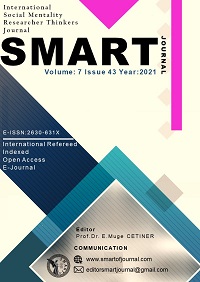Author :
Abstract
Bu araştırma, her bireyin onurlu, gururlu ve başkalarının kontrolü olmaksızın yaşama özgürlüğünden yararlanma hakkına ışık tutmaktadır. Ve bu, inanç özgürlüğü, yeryüzünde kendisinde zarar olmayan her şeyi yemeye izin verilebilirligi, çok eşlilik özgürlüğü, ehl-i kitap yemeklerini yeme ve kadınlarıyla evlenme özgürlüğü ve yasak olmayan şeylerde süslenme özgürlüğü dahil olmak üzere birçok delilde ifâde edilmektedir. Nebevî Sünnet bu özgürlüğü vurgulamıştır. Ki bunların en önemlisi de düşünce özgürlüğüdür. Peygamber sallallahu aleyhi vesellem bu hakkı her bireye vermekte çok önem göstermiştir. Bu çok sayıda örnekte açıkça görülmektedir. Örneğin: iyiliği emretmek ve kötülükten alıkoymak, başkalarına nasihatte bulunmak, kadının süregelen zorluklar karşısında koca seçme ve boşanma özgürlüğü, bilirkişiye içtihat ( görüş) hakkını vermek, muhalifin görüşüne saygı duymak, kadınların görüşünü benimsemek ve istişare ilkesini onaylamak gibi. Bu düşünce özgürlüğüne olan ilgiye rağmen, kefilin onu iyi kullanması için şartlar ve hukuki metnin varlığı ile görüşün yasaklanması, görüşün bilgi ve rehberden kaynaklanma zorunluluğu, heves olarak tasarlanmaması, yolsuzlukla sonuçlanmaması, gıybet, ifşa ve yalanın eşlik etmemesi gibi aşılmaması gereken sınırlar vardır.
Keywords
Abstract
This research focus on the right of every individual to enjoy the personal freedom to live with dignity and pride and without control from others, and this is reflected in many evidences, including: freedom of belief, permissibility to eat everything on earth that does not harm it, freedom of polygamy, freedom of eating the food of the People of the Scripture and marry from them, and the freedom of adornment within the accepted boundaries, as the Prophet’s Sunnah affirmed this freedom, like is the freedom of opinion expression. The Prophet, was concerned with granting this right to every individual, and this was clear in many examples, including: Urging him to enjoin good and forbid On evil and advising others, and the woman’s freedom to choose a husband and divorce when it is hard to continue , granting the right to Ijtihad to those who are qualified , respecting the opinion of the opposition, taking the opinion of women, and adopting the principle of consultation, and with this concern for freedom of opinion, there are some restrictions to ensure the good use, and exceeds limits, such as the prohibition of opinion with the presence of the legal text, and the necessity for the opinion generated from knowledge and guidance, and not to be intended as passion, and not to result in corruption, and not accompanied by backbiting, exposing and lying.





